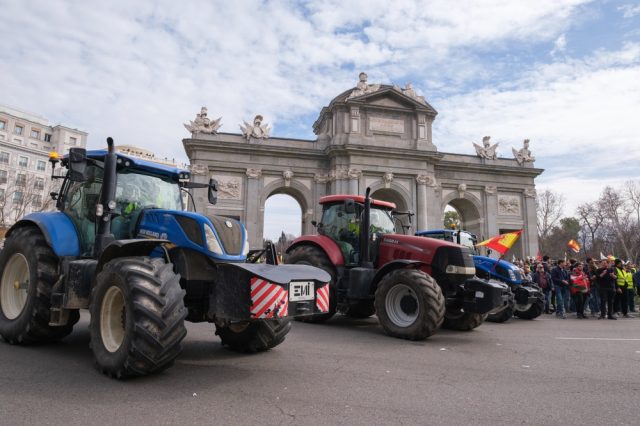
On Wednesday February 21st, mobilizations of more than 500 tractors were planned first thing in the morning. The main aim of this protest lived in the Spanish capital, during the whole day, was for farmers to show the discomfort regarding the crisis in the sector and the agricultural policies established and passed by of the European Union, the Spanish Government and the Autonomous Communities. Assuring that the situation is not sustainable in the long term.
Farmers affirm that their situation is dire, and demand urgent and coordinated action on the part of the administrations regarding this issue. Some of the reasons that have caused these protests is the lack of just prices paid for their products. Farmers believe that the figures obtained by their products are minimum and that the people that work in the field deserve fair compensation. Another motive for the strikes, was the rise in the cost of production, the excessive bureaucracy and amount of legislation faced by the farmers, and the rigid conditions of the agricultural regulations. The last reason that has been highlighted by the protesters are the cutbacks seen in aid provided by the Government and the obstacles and barriers in trade.
This week is the third consecutive week of protests lived in Spain, through which farmers continue to show their discontent and discomfort regarding the crisis the sector and lack of profitability, demanding improvements. Concerning the protest lived yesterday, up to 13,000 people gathered in Madrid to protest in the strike organized by the Union of Unions of Farmers (Unión de Uniones de Agricultores y Ganaderos), the only agrarian organization that did not attend the meeting, last Thursday, with Luis Planas, the Spanish Minister of Agriculture. The final destination of these mobilizations was the headquarters of the Ministry of Agriculture, Fisheries and Food (MAPA) in Madrid.
The protesters marched under the slogan “We have more than enough reasons”. The reunion began early in the morning, when 1,500 tractors were mobilized with the intention of reaching the capital. They followed an organized route, and after leaving the Puerta de Alcalá, the demonstrators began to arrive at the Ministry of Agriculture around 15:00 hours. As reported by the Organization, out of the 1.500 tractors, only 500 reached the destination, and 70 were the ones able to access the gates of the Ministry, occupying the area until 17:00 hours. Besides this strike, others have also been organized by official agricultural organizations such as ASAJA, COAG and UPA.
These protests might have a bigger impact than thought in the Spanish economy. As Javier Santacruz, economist, and researcher of the Spanish Institute of Analysts Foundation has warned “the crisis in the countryside is going to provoke an increase in the price of food both, national produce and imported”, since “the limitations to trade posed by the farmers whom are demanding the European Union to require the same phytosanitary, labor or environmental standards regarding the imported products, will increase the prices of imports, and as a consequence, the prices of domestic goods”.
Another reason for prices to rise, is the fact that professional agricultural organizations are demanding a tightening on the Food Chain Law, particularly, of the provisions which prohibit the sales made at loss, as Santacruz explained, “this has a directly inflationary consequence, since the increase in costs at origin translates into a rise in final prices, causing a spiral.” This is the reason that this claim, which seeks to guarantee fair prices on the producers side, does not favor the customer’s wallet, who will end up having to pay more for the shopping cart as a direct consequence.



 Subscribe
Subscribe